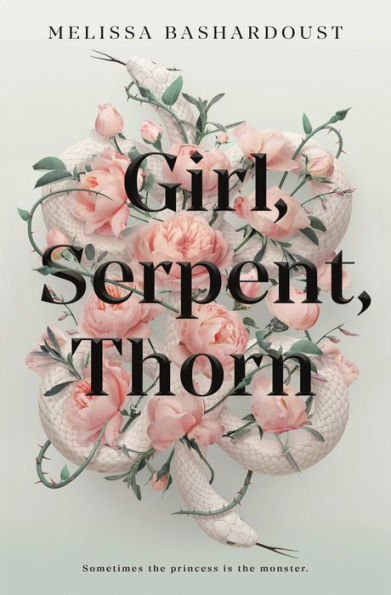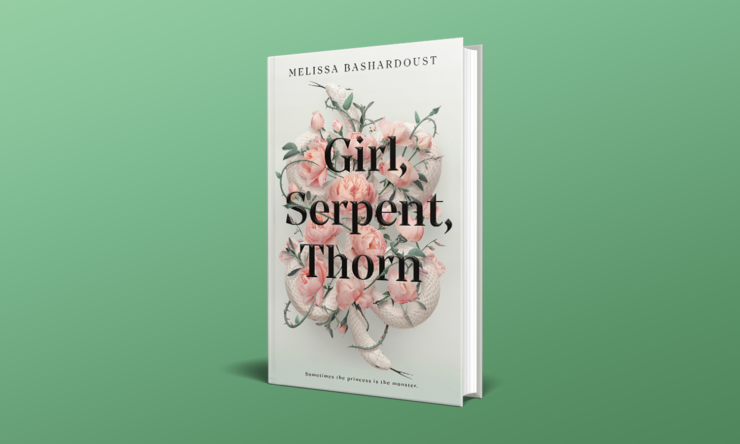Girl, Serpent, Thorn is Melissa Bashardoust’s second novel, a lush stand-alone fantasy inspired by the courts and lore of ancient Persia. Woven through with conflicts of desire and power, loyalty and self-interest, the novel presents a coming-of-age tale that is subversive, queer, and rife with danger. As the intriguing cover copy starts, “There was and there was not, as all stories begin, a princess cursed to be poisonous to the touch.”
Soraya is the twin sister of the shah of Atashar, but their lives run on opposite courses. She has kept to untouched seclusion in the palace through her entire life for the safety of herself and others, as one glancing brush of her skin is lethal. Her lush rose garden and occasionally her mother, brother, or childhood friend Laleh are her only companions—until Laleh stops visiting. However, when her brother brings a captured demon home with him to Golvahar, Soraya sees a chance to bargain for a cure to her curse… except bargaining with devils for knowledge comes at a high cost, and the consequences of Soraya’s actions far exceed the scope of her imagination.
First and foremost: the prose of Girl, Serpent, Thorn is sprawling, luxurious, and handsome without ever sacrificing the fast-paced narrative tension it constructs via constantly evolving intrigues. Bashardoust combines evocative, mythopoetic description with an intimate point of view that links the personal, emotional experiences Soraya has to the wider world she inhabits. Her desire is both a desire for simple human touch and for a totally different life, as neither can be separated from the other. Her yearning, to understand and ultimately fix herself, drives the catastrophe that strikes her kingdom… but yearning also, and more importantly, drives her costly efforts to save Atashar once the full scope of consequences comes to light.
Buy the Book


Girl, Serpent, Thorn
While the device that drives the novel is central to the actual plot—being untouchable, poisonous, unlike one’s family, in need of acceptance and love—it is also… Distinctly queer, thematically. Soraya is a touch-starved, lonely young woman who has only known a handful of other people in her life. Laleh, the first object of her desire as a child, has decided to marry her brother at the start of the novel. It’s no wonder that when the young soldier Azad expresses his admiration for her, his own desire, she responds to it instantly. It’s also no wonder that, when later faced with the fierce and beautiful Parvaneh, Soraya discovers another form of desire—one for someone alike in kind to herself.
Light spoilers follow.
Bashardoust distinguishes the type and feeling of desire Soraya experiences between the genders of her partners while emphasizing that each is legitimate, something I suspect many bisexual readers will appreciate. It’s worth noting that while Soraya reaching for her desires does cause strife in the novel, the resolution also turns on fulfilling desire, except with more attention to other people. That’s a delicate balance to strike, one that allows for emotional complexity as well as struggle to determine what’s right and wrong for Soraya, whose life has been challenging from the start. While the initial conflict comes out of Soraya’s desire to fix herself, the conclusion involves her accepting herself in her whole monstrous glory—thorns and all.
Also, it must be said as clearly as possible: monster girls falling in love with each other is good business. I, in fact, love to see it.
On a more serious note, I’m pleased with this novel’s willingness to engage ethical complexity, the labor of atonement, and the damage well-meaning people do to one another. While this is a broad generalization, I have noticed a trend in recent queer young adult fiction toward a sort of moral puritanism, or surface-level absolutism: a flattened affect that comes across as at once performative (saying the right things from the checklist of approved Issues makes me the right sort of person) and shallow, failing to engage with real human conflict and the process of learning we all go through continually to be good to one another.
Bashardoust, in contrast, weaves a delicious tale of desire, mistakes, anger, violence, and growth. “Good” and “bad” are not absolute personality types that characters signal their membership in. Instead, individuals are allowed to fuck up and make right through serious labor… as well as understanding their own positions of power. Frankly, it’s messy, and I live for the mess. In real life, we’re all kind of messy and (hopefully) working to do the right thing despite it, as Soraya does. That process of wanting, having, and misusing power being explored via a queer young woman of color is just—everything.
Women don’t get to be this kind of messy often in fiction. Soraya has to invest significant labor into recognizing then correcting her mistakes while accepting their consequences. She also is not fully absolved for the harm she causes in self-interest… yet, importantly, the text does not castigate that self-interest as unreasonable selfishness. Bashardoust holds Tahmineh accountable for withholding the truth of Soraya’s curse from her, out of a desire to spare her pain but also to spare herself the shame of admitting her lie—while holding Soraya’s bare handful of potential companions responsible for their failure to acknowledge her isolation. No one is a pure villain; no one is a pure hero.
Soraya herself teeters between villain and hero, princess and monster—but she ultimately combines them as she becomes a woman covered in deadly thorns, able to protect her court and love her parik partner, member of yet individuated from her blood family. My queer heart absolutely beats for this layering, living half in one world and half in another, straddling the line of familial versus personal responsibilities. Soraya accepts her power, her desire, and her potential for violence as morally neutral. The good she might do is a choice, a labor, and that distinction matters. She chooses. Power is not the problem; the use power is put to is the problem—and so she chooses to do right, to make right, what she can.
Girl, Serpent, Thorn balances a raw, human core of emotion with a fast-moving, intriguing plot that draws fresh inspiration from Iranian culture past and present. Soraya is a fascinating protagonist whose approach to the world is always-engaging, even as her constant missteps drive the novel forward. I also want to reemphasize how significant it is to read a novel about a queer young woman in a Middle Eastern-inspired setting pursuing men as well as women—and ending up in a relationship with another monster-woman. For so many of us who grew up identifying with villains, challenged by the desire to get a little revenge (or a lot), Soraya provides a beautiful touchstone. She does wrong; she does right. She chooses.
Girl, Serpent, Thorn is available from Flatiron Books.
Read an excerpt here.
Lee Mandelo is a writer, critic, and editor whose primary fields of interest are speculative fiction and queer literature, especially when the two coincide. They have two books out, Beyond Binary: Genderqueer and Sexually Fluid Speculative Fiction and We Wuz Pushed: On Joanna Russ and Radical Truth-telling, and in the past have edited for publications like Strange Horizons Magazine. Other work has been featured in magazines such as Stone Telling, Clarkesworld, Apex, and Ideomancer.










